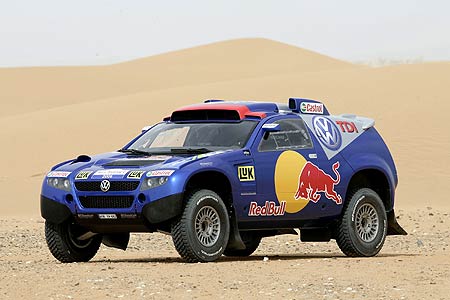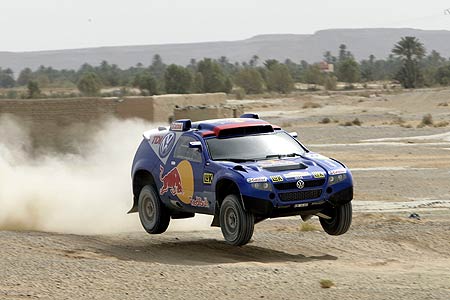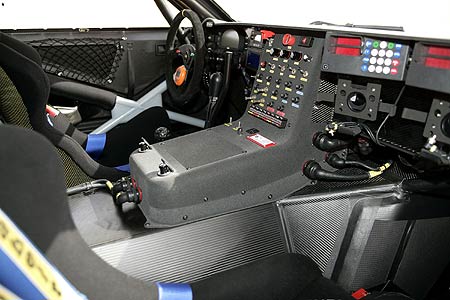VW Has Unique Success in the 2006 Dakar Rally
Volkswagen has set a new ‘personal best’ at the hard fought 2006 Dakar Rally by finishing second with Giniel de Villiers (South Africa) and Tina Thörner (Sweden).
For the first time in the twenty-eight year history of the desert classic a diesel powered car finished second – the new Race Touareg 2 with a 275 hp TDI engine.
With five stage victories, a trio of second fastest times and eight third places and five days leading the field – including filling the top three positions for two days – Volkswagen also stocked up its own account of individual successes compared to last year.
Mark Miller/Dirk von Zitzewitz (USA/D) in fifth place, Bruno Saby/Michel Périn (F/F) in eighth and Carlos Sainz/Andreas Schulz (E/D) in eleventh position completed the results for the team from Wolfsburg. Jutta Kleinschmidt/Fabrizia Pons (D/I) retired following an accident.
“Obviously we are delighted about Volkswagen’s second place finish and also for Giniel de Villiers and Tina Thörner in this year’s Dakar Rally, which was extremely tough, fast and exciting”, explains Volkswagen Motorsport Director Kris Nissen. “At the same time we are disappointed that we didn’t win.
A win was our target. The opportunity and potential were there, but unfortunately they went begging. Congratulations to Mitsubishi, Luc Alphand and Gilles Picard on their victory.”
Kris Nissen, responsible for the Volkswagen brand motorsport activities since summer 2003, further: “Our result was nevertheless an improvement compared to last year. We scored five stage victories. We finished second, fifth, eighth and eleventh overall.
It is the highest ever finishing position for a diesel vehicle at the Dakar Rally and the best result for a German car manufacturer since Porsche won in 1986. We made enormous progress in every aspect – engineering, team and logistics. I think we put regular winner Mitsubishi under significant pressure.
Our summary is that we were at least as good as the strong competition in almost every area, but we have to improve in one or two areas. We have to do some fine tuning to the Race Touareg 2, especially where deep and soft sand is concerned. We lost decisive time here this year.”
Giniel de Villiers, who was only competing in his fourth Dakar Rally and who even took the lead on the sixth day, was constantly in the top-three overall after the eighth of 15 stages. On the challenging twelfth stage the 33-year old South African moved up to second after the eight-time “Dakar” winner Stéphane Peterhansel made a mistake.
The permanently focussed de Villiers and his Swedish co-driver Tina Thörner, who was only signed nine months ago by Volkswagen, also demonstrated their expertise in the toughest of terrain and throughout the marathon stage, and, in doing so, reduced the gap to winner Luc Alphand to 17 minutes in the ‘dash-for-the-line’.
Second best Volkswagen team at the finish are the American Mark Miller and his German co-driver Dirk von Zitzewitz. Miller, who was only competing in his second event for Volkswagen and for the third time at the Dakar Rally, surprised many established opponents with his determined high tempo.
Three stage times in the top-three, including setting exactly the same time as Stéphane Peterhansel on the second longest stage on the rally’s eighth day, highlighted the talent of the American from the state of Arizona. Rolling twice on the seventh stage prevented the American-German duo from finishing even higher up the leader board.
Bruno Saby and co-driver Michel Périn were significantly better than their finishing position suggested. The two Cross Country Rally World Cup winners from last year were in sixth place only 3 minutes 57 seconds behind the leader after the sixth stage, when they lost almost seven hours due to a lose fitting in the fuel supply line.
Within four stages, the two former “Dakar” winners from France had fought their way up the leader board from 22nd overall to 8th position at the finish.
Carlos Sainz and Andreas Schulz dominated the rally at the start. “Dakar” debutant Sainz, a record holder with 26 wins in classic sprint rallying, proved his exceptional talent after changing to cross country rallying. Four stage victories and overall leader on four of the opening five days underlined the expertise of the Spanish-German duo.
A clutch problem on the eighth stage, the result of breaking free from deep sand on the previous day, left the two-time World Rally Champion in a hopeless position more than eight hours behind the leader in sixteenth position. The duo improved to eleventh place at the finish.
Jutta Kleinschmidt and Fabrizia Pons retired after damaging their car irreparably in an accident on the eleventh stage. Whilst running in fifth position, the female German-Italian duo hit a tree stump so awkwardly, after being thrown of course by a pot hole, that the Race Touareg prototype’s front right-hand suspension could not be repaired on the spot. A great series came to an end as a result. Until now Jutta Kleinschmidt and Fabrizia Pons had always reached the finished with Volkswagen.


